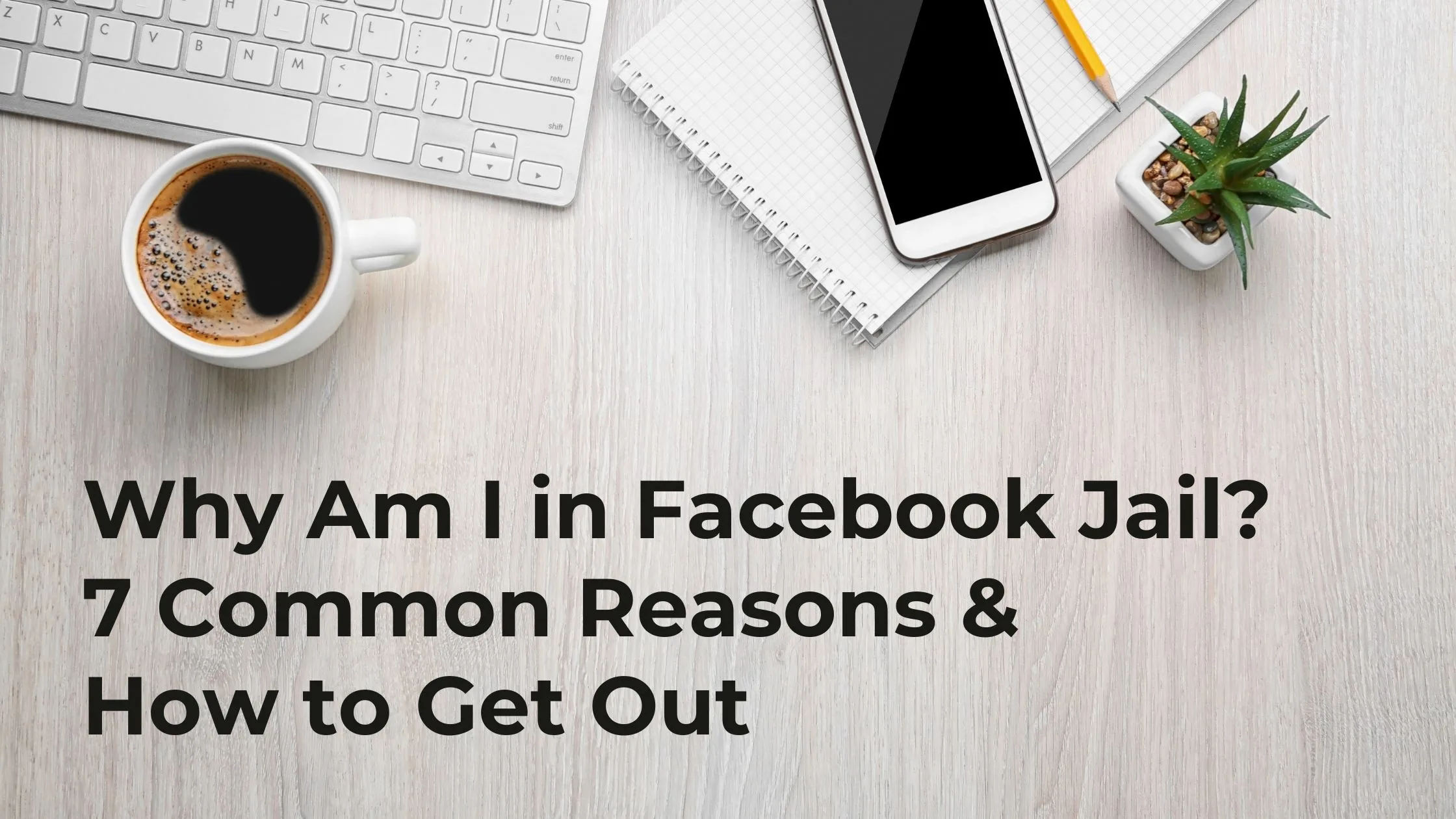“You’re temporarily blocked.”
Those words are every Facebook marketer’s nightmare—especially when running a critical campaign. Even experienced social media professionals can find themselves facing account restrictions.
Let’s break down why Facebook might block your account, what you can do to resolve it, and how to steer clear of Facebook jail in the future.
Key Points to Remember
- Facebook jail can be temporary or permanent—but there are ways to handle both situations.
- Meta applies a strike-based system to limit accounts, and most strikes eventually expire.
- Sticking to Facebook’s Community Standards and Terms of Service is the best way to stay safe.
What Does Facebook Jail Mean?
The term Facebook jail refers to when an account is suspended or banned, limiting what actions you can take on the platform.
Being placed in Facebook jail may result in short-term or long-term restrictions, each with different consequences.
For instance:

When you’re placed in Facebook jail, the restrictions can vary. In some cases, you may be completely locked out of your account. In others, the penalty is lighter—such as losing the ability to comment, post, or use certain features for a limited time.
Meta has the authority to suspend any type of Facebook entity. This can include personal profiles, business pages, professional accounts, ad accounts, or even entire groups.
How to Know if You’re in Facebook Jail
Sometimes, Meta will notify you by email that your account has been suspended or restricted. However, most of the time, you won’t get an email at all.
Instead, you’ll see a notification on your profile or business page. You may also encounter a popup message in the Facebook app or browser, triggered when you attempt an action that goes against Facebook’s Community Standards.
How to Spot a Fake “Jail Notice”
If Facebook is a major part of your marketing efforts, discovering that your account is restricted can be stressful. That urgency makes you vulnerable—and scammers take advantage of it.
Many fraudsters launch phishing attacks disguised as official Facebook violation notices. They appear legitimate but are designed to steal your login details.
Watch out for these red flags that your “suspension” is actually a scam:
- Emails sent from unofficial addresses claiming your account broke a rule. Real messages only come from @metamail.com, @facebookmail.com, or @support.facebook.com.
- Direct messages sent through Messenger instead of platform notifications. These often come from unverified accounts and push you toward suspicious links on non-Facebook domains.

How to Verify if Your Restriction Is Genuine
The most reliable way to confirm whether you’re truly in Facebook jail is by checking your account’s support inbox. Simply log in, switch to the profile or page you want to review, and visit https://www.facebook.com/support.
In the support inbox, you’ll find details about any restrictions and, if needed, you can also submit an appeal to challenge the suspension.
What Does a Facebook Restriction Mean?
Being placed in Facebook jail generally results in one of two outcomes: a temporary restriction or a permanent ban.
Even if the suspension is short-term, Meta’s strike-based system means repeated violations can stack up and lead to longer penalties.
Temporary Restrictions
Temporary suspensions are the most common form of Facebook jail. They can last anywhere from a few hours up to 30 days.
In unusual situations, bans may extend for years—particularly for public figures who have later been reinstated.
Under Meta’s strike system, the first offense usually comes with just a warning. From the second to the sixth violation, you’ll face temporary restrictions on certain features.
Once you reach seven or more strikes, suspensions become progressively longer, limiting your ability to post, comment, or create new pages:
- 7 strikes: One-day ban
- 8 strikes: Three-day ban
- 9 strikes: Seven-day ban
- 10+ strikes: Thirty-day ban
Strikes usually disappear from your account after 90 days.
Even major violations stop counting against you after four years. So, if you’re worried about mistakes from long ago, you can relax—older strikes eventually expire.
Permanent Ban
A permanent ban means Facebook has completely disabled your account with no option to get it back.
Typically, Facebook won’t enforce a permanent ban after just one violation. It’s usually the last step after repeated warnings and multiple temporary suspensions.
That said, serious breaches of Facebook’s rules can result in an immediate and irreversible ban.
7 Reasons You Could End Up in Facebook Jail
Facebook has an extensive list of rules, and breaking them can quickly land you in trouble.
The challenge is that Facebook doesn’t always explain clearly why your post or action triggered a restriction—leaving you to figure it out.
Here are seven common Community Standards violations that can get your account suspended:
1. Behaving Like a Bot
One of the fastest ways to raise red flags is by using Facebook unnaturally. Meta monitors unusual patterns that look automated. Actions that can trigger restrictions include:
- Liking too many posts or comments in a short period
- Sending friend requests or follows too quickly
- Sharing content excessively
Using third-party automation tools to perform these actions can also result in penalties.
2. Spam or Fraudulent Activity
Facebook doesn’t tolerate misleading or deceptive behavior. But its definition of “spam” goes further than most people think. You may face restrictions if you:
- Post links that lead to misleading or low-quality pages
- Buy or sell Facebook groups, pages, or accounts
- Pay for engagement or offer incentives for likes and comments
Additionally, scams such as gambling schemes, fake investments, or credit repair guarantees are strictly prohibited.
3. Sharing Misinformation
We’ve all seen questionable claims floating around on Facebook. To prevent the spread of harmful content, Meta bans misinformation and hoaxes—especially those related to vaccines, health crises, and elections.
4. Using Copyrighted or Trademarked Material
Facebook enforces strict intellectual property rules. You can’t post content you don’t own or lack permission to use—including images, videos, text, or audio.
If you’re unsure whether you can share something, it’s best to confirm with your legal team. Otherwise, focus on publishing original material and always ensure you have the rights to use any third-party content, from popular songs to user-generated media.
5. Using Hate Speech or Encouraging Violence
Meta strictly forbids targeting individuals based on protected attributes such as gender identity, sexual orientation, ethnicity, race, disability, or religion.
The rules also ban harmful stereotypes or attacks directed at refugees and migrants. Facebook categorizes hate speech into two levels, each addressing different degrees of severity.
Additionally, threats of violence, admissions of violent acts, or glorifying violent behavior are not permitted under any circumstances.
6. Exploiting Individuals or Sharing Nudity
Content that exploits adults or children is completely prohibited. This includes material linked to human trafficking, such as forced labor, marriages, or criminal activities. It also applies to intimate photos or videos shared without the person’s consent.
While nudity is generally not allowed, Facebook makes exceptions for artistic or medical purposes. Even then, this type of content is usually restricted to users aged 18 and older.
7. Selling Prohibited Goods or Services
Although businesses can use Facebook to promote products, certain categories are off-limits. According to Meta’s policies, the sale of the following is not allowed:
- Firearms, ammunition, or explosives
- Hazardous or dangerous materials
- Tobacco and nicotine-based products
- Illegal or high-risk drugs
- Alcoholic beverages
- Cultural or historical artifacts
Meta also enforces age restrictions on several industries. If your business involves online gambling, cannabis, or health-related products, it’s important to review Facebook’s advertising and commerce policies carefully to avoid repeated violations.
How to Get Out of Facebook Jail
The process of regaining access to your account depends on the seriousness of the violation and whether you’ve had previous restrictions.
Wait It Out and Adjust Your Activity
If this is your first offense or the violation is considered minor, the simplest approach is to let the suspension run its course.
For instance, if your account was flagged for replying too quickly to comments on your page, stop the activity and check back after a few hours.
When your access is restored, avoid repeating the same behavior. Returning to old habits will only increase the chances of another restriction.
To prevent future issues, follow the recommendations mentioned earlier—review Facebook’s policies carefully and stick to its Community Standards. Most importantly, don’t repost or recycle any content that was previously removed for violations.
File an Appeal
If your restriction is longer, or if you believe it was applied unfairly, you can request a review.
To do this, go to your support inbox linked to your page or profile. From there, look at the listed Community Standards violation and submit an appeal directly through the platform.

Another option is to go to your Facebook page’s Settings & Privacy section. There, you can review any account status notifications and submit a request for Facebook to re-examine the Community Standards violations linked to your account.

If Facebook permanently disables your account, you have a limited window to take action. You must request a review within 180 days—after that, the option to recover your account is no longer available.
That said, it’s not a good idea to appeal every single violation. Meta may eventually remove your ability to submit appeals altogether, leaving you without that option when you truly need it.
If your page has accumulated multiple strikes, the best approach is to realign with Facebook’s Community Standards. This may involve revising your content strategy or adjusting the tools you use to manage your Facebook marketing.
Report Your Account as Compromised
If your account was restricted because it was taken over and used for spam or suspicious activity, you should report it as hacked.
Go through Facebook’s official portal for compromised accounts, then review your violations and file appeals where appropriate.
Conclusion
In most situations, account restrictions are only temporary—Facebook jail doesn’t last forever.
However, the more violations you accumulate, the higher your chances of facing a permanent ban.
To protect your Facebook presence and continue using the platform effectively for marketing, it’s essential to understand the rules and follow them carefully.
Remember, Facebook is just one piece of a broader social media strategy. If you need support in creating a strong paid or organic social media plan, our agency is ready to help you succeed.
FAQs About Facebook Jail
How long does Facebook jail last?
The length of a suspension depends on how many strikes are on your account. A first offense usually results in just a warning, but repeated violations lead to longer bans. Restrictions may last from a few hours up to 30 days. For example:
- 7 strikes: 1-day ban
- 8 strikes: 3-day ban
- 9 strikes: 7-day ban
- 10+ strikes: 30-day ban
Most strikes are cleared after 90 days, while more serious ones expire after four years.
What does “Facebook jail” mean?
Facebook jail is an informal term used to describe when Meta suspends or restricts an account. This can range from losing access to posting or commenting for a short time to a complete account disablement. Restrictions can apply to personal profiles, business pages, ad accounts, and even groups if they violate Facebook’s Community Standards.
How can I get out of Facebook jail?
There are a few ways to recover from a restriction:
- Wait it out: If the violation is minor, your access will be restored once the suspension period ends.
- File an appeal: Use your support inbox to request a review, especially if you believe the strike was a mistake.
- Report a compromised account: If someone else caused the violation by hacking your account, report it as compromised through Facebook’s recovery portal.
How do I know if my account is in Facebook jail?
Typically, you’ll get a notification or popup when you try to perform a restricted action, such as posting or commenting. You can also check your Support Inbox at facebook.com/support for details and appeal options. Be cautious of phishing scams—fake alerts are often designed to steal login credentials.
Can a permanent ban be reversed?
Yes, but only if you act quickly. You generally have up to 180 days to request a review after a permanent disablement. If you miss that deadline, your account cannot be recovered.
Does Facebook jail affect advertising?
Yes. If your ad account is restricted, you won’t be able to run ads or manage campaigns. In some cases, Facebook may also restrict your ability to manage business pages connected to that ad account.
Do old strikes still count against me?
No. Most strikes drop off after 90 days, and serious violations are cleared after four years. Once expired, they no longer affect your account status.
What’s the best way to avoid Facebook jail?
The most effective way is to follow Facebook’s Community Standards closely. Avoid spammy behavior, don’t post misleading or copyrighted content, and stay clear of promoting restricted items. Creating original, authentic content is the safest long-term strategy.




